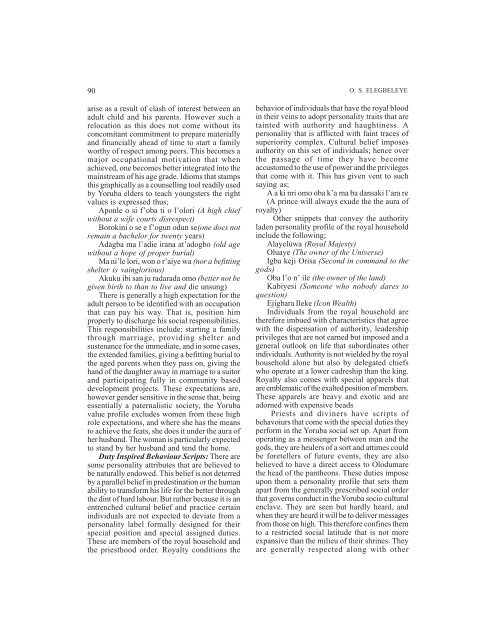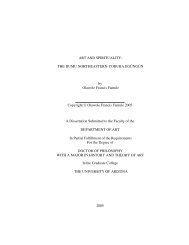The Yoruba Personality Assessment Criteria
You also want an ePaper? Increase the reach of your titles
YUMPU automatically turns print PDFs into web optimized ePapers that Google loves.
90<br />
arise as a result of clash of interest between an<br />
adult child and his parents. However such a<br />
relocation as this does not come without its<br />
concomitant commitment to prepare materially<br />
and financially ahead of time to start a family<br />
worthy of respect among peers. This becomes a<br />
major occupational motivation that when<br />
achieved, one becomes better integrated into the<br />
mainstream of his age grade. Idioms that stamps<br />
this graphically as a counselling tool readily used<br />
by <strong>Yoruba</strong> elders to teach youngsters the right<br />
values is expressed thus;<br />
Aponle o si f’oba ti o l’olori (A high chief<br />
without a wife courts disrespect)<br />
Borokini o se e f’ogun odun se(one does not<br />
remain a bachelor for twenty years)<br />
Adagba ma l’adie irana at’adogbo (old age<br />
without a hope of proper burial)<br />
Ma ni’le lori, won o r’aiye wa (nor a befitting<br />
shelter is vainglorious)<br />
Akuku ibi san ju radarada omo (better not be<br />
given birth to than to live and die unsung)<br />
<strong>The</strong>re is generally a high expectation for the<br />
adult person to be identified with an occupation<br />
that can pay his way. That is, position him<br />
properly to discharge his social responsibilities.<br />
This responsibilities include; starting a family<br />
through marriage, providing shelter and<br />
sustenance for the immediate, and in some cases,<br />
the extended families, giving a befitting burial to<br />
the aged parents when they pass on, giving the<br />
hand of the daughter away in marriage to a suitor<br />
and participating fully in community based<br />
development projects. <strong>The</strong>se expectations are,<br />
however gender sensitive in the sense that, being<br />
essentially a paternalistic society, the <strong>Yoruba</strong><br />
value profile excludes women from these high<br />
role expectations, and where she has the means<br />
to achieve the feats, she does it under the aura of<br />
her husband. <strong>The</strong> woman is particularly expected<br />
to stand by her husband and tend the home.<br />
Duty Inspired Behaviour Scripts: <strong>The</strong>re are<br />
some personality attributes that are believed to<br />
be naturally endowed. This belief is not deterred<br />
by a parallel belief in predestination or the human<br />
ability to transform his life for the better through<br />
the dint of hard labour. But rather because it is an<br />
entrenched cultural belief and practice certain<br />
individuals are not expected to deviate from a<br />
personality label formally designed for their<br />
special position and special assigned duties.<br />
<strong>The</strong>se are members of the royal household and<br />
the priesthood order. Royalty conditions the<br />
O. S. ELEGBELEYE<br />
behavior of individuals that have the royal blood<br />
in their veins to adopt personality traits that are<br />
tainted with authority and haughtiness. A<br />
personality that is afflicted with faint traces of<br />
superiority complex. Cultural belief imposes<br />
authority on this set of individuals; hence over<br />
the passage of time they have become<br />
accustomed to the use of power and the privileges<br />
that come with it. This has given vent to such<br />
saying as;<br />
A a ki nri omo oba k’a ma ba dansaki l’ara re<br />
(A prince will always exude the the aura of<br />
royalty)<br />
Other snippets that convey the authority<br />
laden personality profile of the royal household<br />
include the following;<br />
Alayeluwa (Royal Majesty)<br />
Oluaye (<strong>The</strong> owner of the Universe)<br />
Igba keji Orisa (Second in command to the<br />
gods)<br />
Oba l’o n’ ile (the owner of the land)<br />
Kabiyesi (Someone who nobody dares to<br />
question)<br />
Ejigbara Ileke (Icon Wealth)<br />
Individuals from the royal household are<br />
therefore imbued with characteristics that agree<br />
with the dispensation of authority, leadership<br />
privileges that are not earned but imposed and a<br />
general outlook on life that subordinates other<br />
individuals. Authority is not wielded by the royal<br />
household alone but also by delegated chiefs<br />
who operate at a lower cadreship than the king.<br />
Royalty also comes with special apparels that<br />
are emblematic of the exalted position of members.<br />
<strong>The</strong>se apparels are heavy and exotic and are<br />
adorned with expensive beads<br />
Priests and diviners have scripts of<br />
behavoiurs that come with the special duties they<br />
perform in the <strong>Yoruba</strong> social set up. Apart from<br />
operating as a messenger between man and the<br />
gods, they are healers of a sort and attimes could<br />
be foretellers of future events, they are also<br />
believed to have a direct access to Olodumare<br />
the head of the pantheons. <strong>The</strong>se duties impose<br />
upon them a personality profile that sets them<br />
apart from the generally prescribed social order<br />
that governs conduct in the <strong>Yoruba</strong> socio cultural<br />
enclave. <strong>The</strong>y are seen but hardly heard, and<br />
when they are heard it will be to deliver messages<br />
from those on high. This therefore confines them<br />
to a restricted social latitude that is not more<br />
expansive than the milieu of their shrines. <strong>The</strong>y<br />
are generally respected along with other




